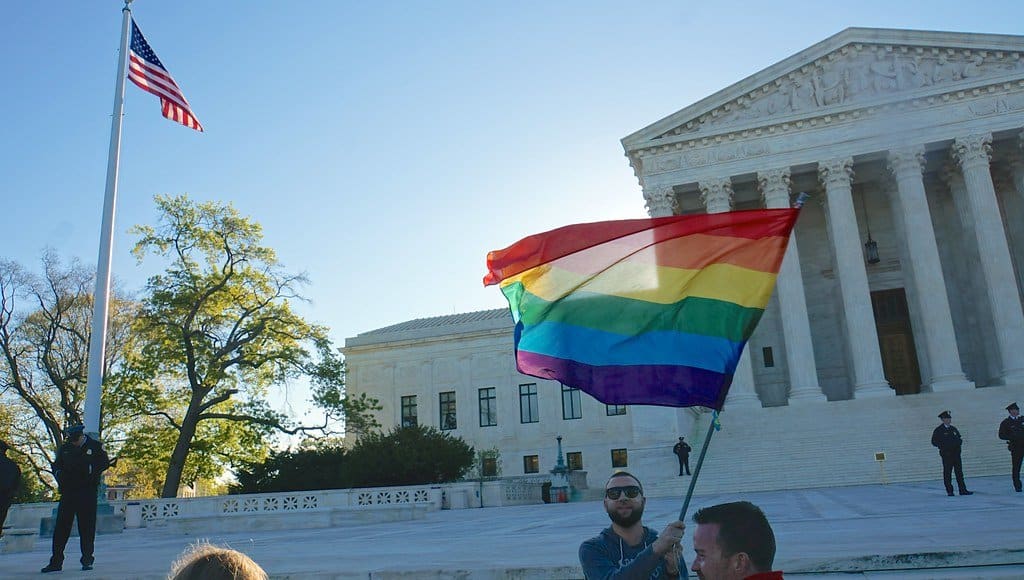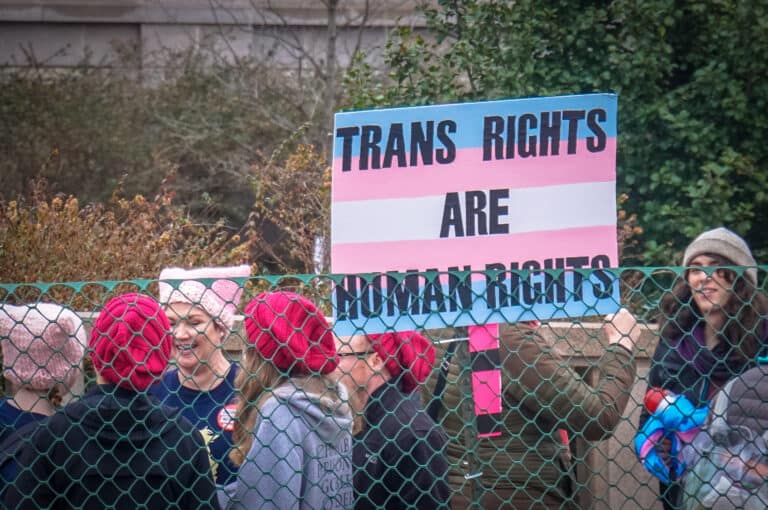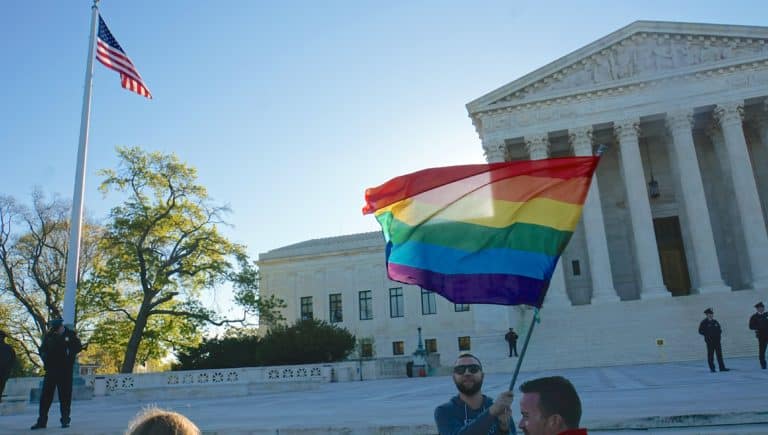This post concludes our review of the amicus briefs submitted in support of the employers in Bostock, Zarda, and Harris. We will provide coverage of oral argument on October 8.
Conservative Legal and Policy Organizations
A group of family policy-focused organizations argue that a gender identity-inclusive definition of sex discrimination would have deleterious implications for parental rights in areas of law outside Title VII. For instance, parents could lose the right to send their children to all-girl or all-boys schools where all of the children were assigned female or male at birth.
Judicial Watch claims that while a history of congressional inaction is typically unusable in deciding questions of statutory interpretation, the fact that Congress has failed to pass 75 bills in just under 45 years that would have added sexual orientation and gender identity to Title VII is evidence “overwhelming” enough to establish that those categories are not currently included.
A group of conservative public policy nonprofits led by Public Advocate of the United States contend that Stephens was fired not for being transgender, but rather for failing to comply with the company dress code. A decision recognizing Stephens’s Title VII claims would promote lawlessness by forcing employers to defer to employees’ own conceptions of their gender identity and would involuntarily conscript employers in their employees’ chosen therapeutic programs.
Former Secretary of Education William J. Bennett parrots the leading arguments made by Harris in its opening brief.
David A. Robinson, a lawyer, argues that the categories that Title VII protects are immutable (including religious origin and background). Because, in his view, sexual orientation is not immutable, Title VII does not encompass it. Moreover, because sex is immutable, no person is transgender.
The National Organization for Marriage and Center for Constitutional Jurisprudence contends that all three cases are fundamentally about separation of powers. Neither the “unelected bureaucracy” that is the EEOC nor the judiciary should decide an issue that is for Congress to determine.
The New Civil Liberties Alliance asks the Court to repudiate its line of cases granting the EEOC “great deference” with respect to interpretations of Title VII. Congress never granted the EEOC rulemaking authority over the statute’s substantive provisions, but it has inappropriately obtained the same result through “regulatory guidance.” Employers either follow the guidance or risk enforcement action. When the EEOC acts, some lower courts then defer to its interpretations. The Court should clarify that the EEOC is owed nothing more than Skidmore deference.
The Foundation for Moral Law argues that the framers of the Civil Rights Act of 1964 could never have intended to protect against discrimination on the basis of sexual orientation because homosexual conduct was then criminalized in all 50 states and was widely viewed as immoral.
A group of conservative public policy nonprofits led by Public Advocate of the United States warn of a slippery slope toward the protection of serial adulterers, predators, pedophiles, and others if Title VII is expanded to prohibit discrimination because of sexual orientation. They say, for instance, that men attracted to underage girls and women who are attracted to underage boys could lay claim to the same sex stereotyping principle relied on by the employees in Zarda and Bostock.
The Marriage Law Foundation explains that, in the context of same-sex marriage cases, the Court and many lower courts consistently declined to hold that discrimination based on sexual orientation is a form of sex discrimination.
Liberty Counsel says that Title VII only bars sex discrimination against men or women as a class. Gender identity and sexual orientation discrimination target subsets of both men and women, so they do not qualify. Extending Title VII’s prohibition against sex discrimination to cover gender identity and sexual orientation discrimination would present free speech and free exercise concerns.
The Foundation for Moral Law warns of a “collision course with religious liberty” if the Court reads Title VII to prohibit gender identity discrimination. When religious and transgender employees inevitably clash in the workplace, employers who side with the religious employees would face sex discrimination claims while employers who side with the transgender employees would face religious discrimination claims. State and local governments would face free exercise challenges under the First Amendment if they denied unemployment benefits to religious employees for failure to call transgender employees by their pronouns or share a bathroom with them.
The Center for Arizona Policy calls attention to the First Amendment problems that result from requiring individuals to use certain pronouns and grammar and forcing them to espouse a particular viewpoint about transgender people. Such compelled speech would be a particular problem in the classroom, the supposed “marketplace of ideas,” and in the medical field, where professionals would need to espouse views about sex that run afoul of their training and judgment.
The Great Lakes Justice Center highlights the separation of powers and other constitutional issues that would arise from an expansive reading of Title VII. First, reading Title VII to encompass protections against gender identity discrimination would bypass Congress, the exclusive federal legislative body. Second, it would infringe on the right to bodily privacy. That right includes “the right to be free from the risk of intimate exposure of oneself to the opposite sex,” which would be threatened by allowing transgender people into restrooms and locker rooms that match their gender identity. Third, an expansive reading would infringe on the right to freedom of speech and religious conscience by forcing employers and individuals to espouse pro-LGBTQ views. Fourth, it would infringe on the right to personal identity and autonomy developed in Obergefell by suppressing the identities of religious people.
Free Speech Advocates says that the success of Stephens’s claim rests on two faulty premises: that gender identity discrimination is an administrable concept and that Stephens is a woman. Gender identity discrimination is not administrable because it would dissolve all sex categories. Stephens cannot be a woman because reliance on internal feelings about one’s gender ignores “biological reality.”










Daily News & Commentary
Start your day with our roundup of the latest labor developments. See all
June 30
Antidiscrimination scholars question McDonnell Douglas, George Washington University Hospital bargained in bad faith, and NY regulators defend LPA dispensary law.
June 29
In today’s news and commentary, Trump v. CASA restricts nationwide injunctions, a preliminary injunction continues to stop DOL from shutting down Job Corps, and the minimum wage is set to rise in multiple cities and states. On Friday, the Supreme Court held in Trump v. CASA that universal injunctions “likely exceed the equitable authority that […]
June 27
Labor's role in Zohran Mamdani's victory; DHS funding amendment aims to expand guest worker programs; COSELL submission deadline rapidly approaching
June 26
A district judge issues a preliminary injunction blocking agencies from implementing Trump’s executive order eliminating collective bargaining for federal workers; workers organize for the reinstatement of two doctors who were put on administrative leave after union activity; and Lamont vetoes unemployment benefits for striking workers.
June 25
Some circuits show less deference to NLRB; 3d Cir. affirms return to broader concerted activity definition; changes to federal workforce excluded from One Big Beautiful Bill.
June 24
In today’s news and commentary, the DOL proposes new wage and hour rules, Ford warns of EV battery manufacturing trouble, and California reaches an agreement to delay an in-person work mandate for state employees. The Trump Administration’s Department of Labor has advanced a series of proposals to update federal wage and hour rules. First, the […]